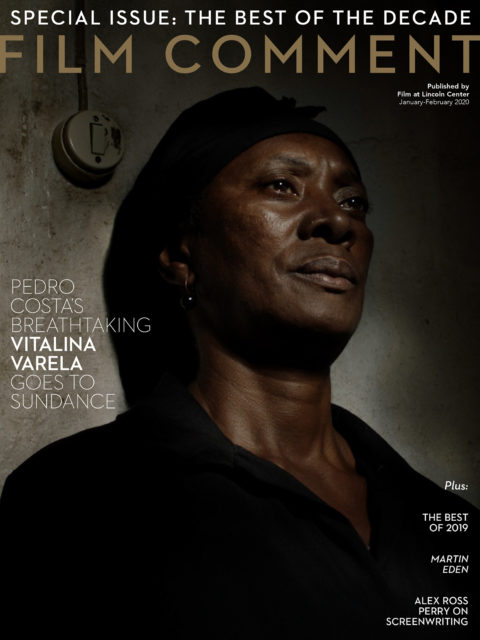
New American Songbook
Composer Nicholas Britell is steadily shaping the sound of modern American storytelling, one project at a time. Britell is probably best known as the composer who scored Moonlight and If Beale Street Could Talk, both of which netted him Oscar nominations. In 2019, he was named Film Composer of the Year by the World Soundtrack Academy for If Beale Street Could Talk. Two years earlier, the same organization named him Discovery of the Year.

Britell is the intangible presence who takes the sensitive, heartfelt work of director Barry Jenkins and translates its tender emotion into sound. He’s presently collaborating with Jenkins again on the director’s limited-series adaptation of the Colson Whitehead novel The Underground Railroad.
“The process is very experimental and it starts from that first moment of sensitivity,” Britell explained during a recent phone interview. “The first time you see a piece of footage, or a cut of something, I always think it’s really important to be very aware of what you’re actually experiencing or what you’re actually thinking because that first experience only happens once. It’s that first kernel of a feeling or an idea. Every future time you see it is going to be referring back to that first time in some way. A lot of it is about being very aware of those initial reactions, and then experimenting right away with certain things. When I was younger, I remember when I would play a piece of music that I hadn’t played before. The first time reading it through, in some ways, was always the most interesting, because you’re feeling these chords for the first time. You’re feeling the grooves of these pieces, and it kind of sets a baseline for the way you feel about something. It’s [like] the first time you read a book, the first time you see anything: there’s that first imprint.”
Currently, Britell is in the beginning stages of a new project—a reimagining of Carmen, directed by Benjamin Millepied, dancer, choreographer, and husband to Natalie Portman. Though he couldn’t reveal much about the film, Britell did say that it will feature completely original music. Those listening for Georges Bizet’s “Habanera” should turn their ears elsewhere.

Succession
Britell’s profile has risen as he’s become known as the man behind the unforgettable theme to Succession, HBO’s Shakespearean tale of an aging media titan; his pampered, protected children; and their internecine squabbling and jostling for control of the family business. With tensely ominous strings and high-pitched piano plinks, set against a heavy, driving bass, Britell created a sonic coat of arms for the Roy family, and the internet ate it up. There’s an official remix called “Puppets” that features the lyrics of rapper Pusha-T. But the iteration that truly captures the farcical self-seriousness of the Roys and their various rich-people problems was created by a YouTuber named Demi Adejuyigbe, who sings along to the melody: “All the rich white folk are going to argue / and then whoever’s best is going to win a kiss from Daddeeeeeeeeeey.”
The 39-year-old Britell has cultivated a public presence that feels different from composers with heavily classical backgrounds. He has a traditional pedigree: he graduated from Juilliard’s pre-college division, then studied psychology at Harvard, where he focused on neuromusicology—that is, how the brain understands music.
“I was always fascinated, from when I was very young, with why there were certain feelings in music,” Britell said. “I was always curious, what is it about this chord? What is it about this melody that makes me feel a certain way? There’s a whole field of neuromusicology where people study and do research and experiments. One of my fascinations was with exactly those kinds of questions. As with anything that’s really profound or mysterious, the more you dive into it, the more mysterious it seems. I don’t have more answers. I got more questions from looking deeply into it. I think the brain and our emotions are such a deep mystery. I’ve just always been drawn to figuring out why I feel a certain way.”
Britell’s works seem to organically straddle accessibility and sophistication in a way that goes beyond the typical programming of a big-city pops orchestra. They never sound as though they’re meant to be confined to padded symphony halls where the average age of the patrons is on the high end. That might have something to do with the fact that Britell has long had one foot in the world of hip-hop and another in the world of classical music—while at Harvard he was part of a hip-hop group called the Witness Protection Program. Britell, who grew up on New York’s Upper West Side, came of age during the ’90s, the golden age of hip-hop. He’s a human bridge between the South Bronx and Lincoln Center.
So when a remix to the Succession theme blows up online, it’s not saddled with the jokey awkwardness that often characterizes sonic meetings between classical and hip-hop. (A good example of this would be the scene in the 2003 film Head of State, when Chris Rock’s character interrupts a staid dinner, populated mostly by older white politicos and donors, to throw on Nelly’s “Hot in Here.”) Instead, it’s just normal.

Moonlight (Barry Jenkins, 2016)
Perhaps that’s why Britell’s body of work is beginning to feel like he’s assembling various sketches of America in a way that will come to define an era, similar to the way that John Williams, Hans Zimmer, and Aaron Copland have done in decades past. Moonlight, If Beale Street Could Talk, Succession, Vice, Free State of Jones, The Big Short, and Battle of the Sexes all offer peeks into different layers of American life. There’s the obscene wealth of the Roys in Succession and the informed cynicism of The Big Short. In Free State of Jones, which Britell scored, and 12 Years a Slave, for which he wrote the fiddle music that’s played by Solomon Northup (Chiwetel Ejiofor), Britell’s compositions guide the audience through obscene violence and inhumanity. In 12 Years a Slave, we experience the sickening soundtrack of forced joy that accompanies human bondage. It’s all part of a larger mosaic, threaded together by one man’s emotions and how he translates them into notes and time signatures.
“So much of the work that I do is based on my fascination with or inspiration by the filmmakers,” Britell said. “There are people who I think are so brilliant and inspiring to me, like Barry [Jenkins] and Adam [McKay]. These filmmakers, as well, are very fascinated with the times that we’re living in. In some ways, being able to create music which helps us to understand the times that we’re living in, or to look at the land that we’re living in, it can be, hopefully, a revealing or profound experience. The dream is that you can create work that can live, also, outside of the times that you’re living in, that can zoom out in some way and give you a deeper or larger understanding of things.”
Without intending to do so, Britell zoomed out with If Beale Street Could Talk. It happened by coincidence. And it happened when the composer’s work was out in the world and ripe for reinterpretation and appropriation. For Beale Street, Britell created aural tributes to black romance, capturing the unique bittersweetness of hope in times of racialized peril. The same week the film was released, the University of Chicago announced that a scholar had discovered an 1898 short called Something Good—Negro Kiss. Now added to the National Film Registry, the work is believed to be the earliest depiction of two black people kissing on film. Britell’s work on Beale Street was so evocative that a Twitter user pulled the sound from one of the tracks, “Agape,” and set it against the newly discovered work. The tweet went viral.
“Stories, they’re almost like a technology of their own,” Britell said. “They’re like this amazing mechanism for understanding things. You can do all this research, you can read all the reports about things, you can study things, but sometimes story, in and of itself, or a film or a novel, they can just make you feel something—as opposed to just intellectually understanding something. I do think about that, the way ideas can be transmitted. But ultimately, for people to really understand things, I think it’s about feeling those things.”







